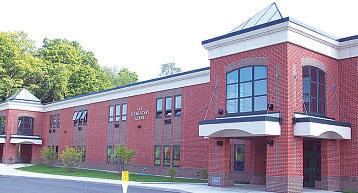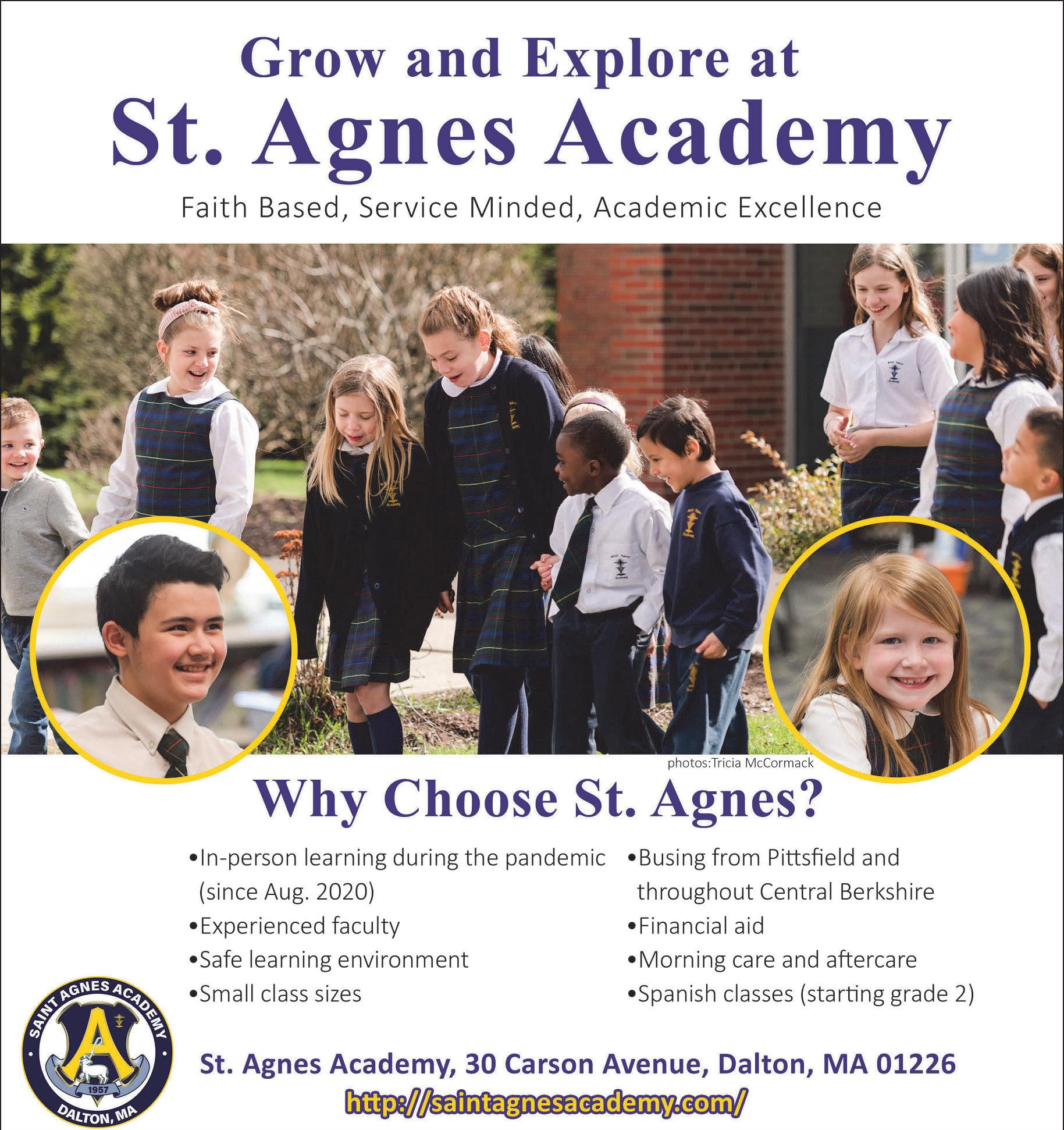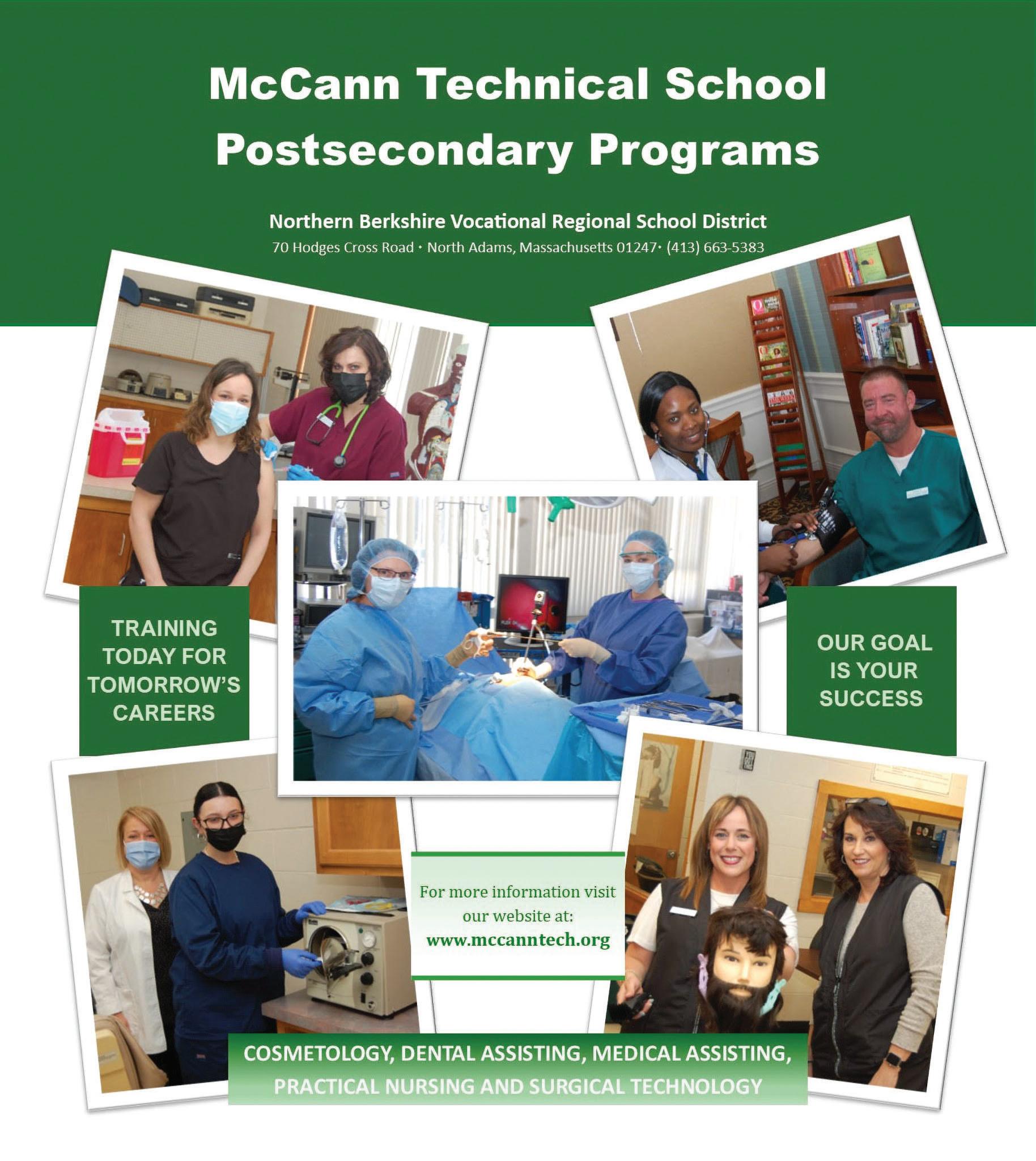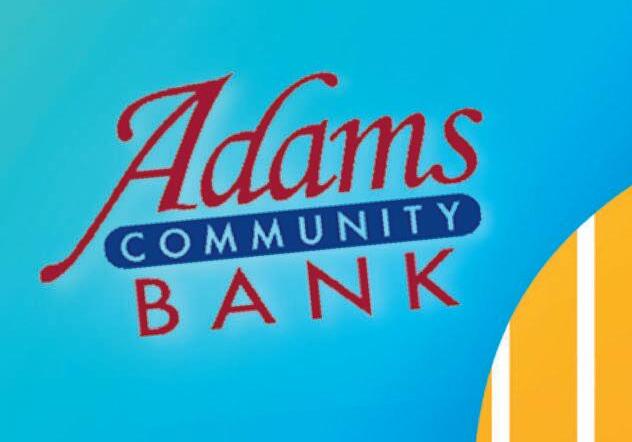




























































Striking teachers. Free school meals. Artificial intelligence. These are three of the many education-related issues Massachusetts lawmakers are proposing legislation for this year.
Local legislators have all said education is a priority for them this year, in one way or another. State Rep. Tricia Farley-Bouvier is introducing a bill to bolster student rights; State Sen. Paul Mark is supporting a bill to better fund public colleges and universities; State Rep. Smitty Pignatelli, D-Lenox, wants to establish a farmsto-schools pipeline for food; and State Rep. John Barrett, D-North Adams, wants to more equitably fund rural schools.
Here’s a look at the proposed 2023-2024 education bills in the state legislature with implications for the Berkshires.

This bill would allow for student members of the school committee to be able to vote on school committee matters. It specifically rewrites Massachusetts General Laws to provide for two student representatives elected by student bodies who will be allowed to vote on city/town/regional school committee matters. The legislation also stipulates the forming of student advisory committees,
Teachers currently cannot legally strike in Massachusetts. Proposed legislation would change this law, providing teachers the right to strike.

elected by students, “to assist the elected student representatives.”

This legislation, which was written in part with ChatGPT, an artifi-
cial intelligence model, aims to regulate AI in the classroom. It would require chatbots like ChatGPT to be programmed with a watermark, or to offer some other sort of authentication process, to prevent plagiarism. Teachers would be able to tell
whether an essay, for instance, was written by a student’s own hand.

This bill aims to improve student diets while also offering
an economic boon to farmers. It would establish a farm-to-school grant program to aid primary and secondary public schools in buying local ingredients for cooking school meals. It also establishes an advisory committee comprised of representatives from the Department of Agricultural Resources, the Department of Early Education and Care, and a “geographically and demographically diverse group of stakeholders.”
Under this bill, schools would be mandated to include “prescription opioid abuse prevention, with an emphasis on the prescription drug epidemic and the connection between prescription opioid abuse and addiction to other drugs, such as heroin,” in its health education curriculum. Proponents believe schools are a good way to reach young people about opioid prevention.


State Rep. John Barrett, D-North Adams, plans to introduce an amendment on a larger bill to better fund rural school districts. He said the 2019 Equal Opportunity Education Act is not equitably funding Adams and North Adams. “North Adams is a regional school district, so it’s shut out of rural aid,” Barrett said. “Adams and North Adams both have declining enrollments, both have a lot of poverty and a number of students on the free lunch program. They’re not getting the aid, when you look at a city like Pittsfield that gets $5 million.”
Barrett is picking the right bill to raise the amendment to more equitably fund rural schools.

Lawmakers are trying to make permanent a policy implemented during the pandemic providing free school meals — including breakfast and lunch — for all Massachusetts students. To pay for the measure, schools would access federal funds, and, when those funds run out, would be financed by the Department of Elementary and Secondary Education. The bill has dozens of co-sponsors, and all Berkshire delegation members support it.

With Massachusetts’ declining college enrollment, legislators such as state Sen. Paul Mark are pushing for the CHERISH Act, which establishes minimum funding for public colleges and universities and bars any institution from raising tuition for four years, as long as the state meets its funding commitments. It would increase funding to the state’s public colleges and universities. Supporters of the bill say a lack of state funding is partially to blame for tuition increases and cost-cutting practices such as faculty reduction.
Teachers currently cannot legally strike in Massachusetts; this Massachusetts Teachers Association-supported bill would change that. The legislation would provide the right to strike for teachers as well as other public employees. Teachers’ unions still strike in Massachusetts, but face a financial penalty in doing so. Proponents argue that teachers are not afforded leverage in contract negotiations because of the strike ban.
learn everyday and empower allstudentstorecognizeandoptimizetheirfullpotential.
AcademicExcellence
CollaborationwithMCLAand WilliamsCollegeforcreative, hands-onSTEMlearningand studentmentoring
ArtsandMovement

Comprehensivevisualand performingartseducationK-12, featuring;instrumentalmusic, marchingandjazzbands, choralmusic,andstudioart withaceramicsprogram
DruryPerformingArtsCenter (DPAC)musicandtheatre productionsthroughoutthe academicyear

Off-campusvisualand performingartslearningat MASSMoCA,MCLAand WilliamsCollege
13 APcourses
Rigorous,research-based curriculumandinnovative learningexperiencessuchas ProjectLeadTheWay's ComputerSciencePathway andDualEnrollment/Early Collegeopportunitiesearning NorthAdamsStudentsover 400collegecreditsperyear 2
Exemplary21stCenturyafterschoolandsummerprogram Collegeandcareerplanning, admissionsvisits,internships, jobshadowing,andcareerplanningspeakers

BerkshirePortraitofa Graduateacademic experiencesfocusedon communication,critical thinking,learner'smindset, personalresponsibility,and citizenship
8 AthleticPrograms 14
Continuous Learning CollegeCourses (onDruryCampus)


Contactus:10MainStreet,SecondFloor,NorthAdams,MA01247 Phone:(413)776-1458
www.napsk12.orgwww.facebook.com/NAPSk12/
A recent report from the Center on Education and the Workforce at Georgetown University revealed just how valuable a college degree continues to be. As tuition costs at many colleges and universities rise and families wonder if investing in a college degree is as wise as it once was, the CEW report can reassure parents and their children that a college degree remains a valuable asset that pays significant financial dividends over the long haul.
According to the CEW report, adults with a bachelor’s degree earn an average of $2.8 million during their careers. By contrast, adults with a high school diploma earn an average of $1.6 million over the course of their careers, while those without a diploma earn $1.2 million in their lifetimes.


One key consideration for individuals concerns when education may not provide the expected financial return. Though people pursue advanced degrees for a variety of reasons, including the potential to earn more money over the course of their careers, the CEW study found that the average person with a master’s degree
earns $3.2 million in their careers, or just $400,000 more than someone with a bachelor’s degree. Though $400,000 is a significant sum of money, given the cost to obtain a master’s degree and the work required to earn it, some individuals, particularly those who would pursue such a degree solely to improve their earning potential, may not deem the investment worth their time or money. That’s a consideration for people given the average cost of a master’s degree, which the Education Data Initiative reports is slightly more than $66,000.
Field of study is another consideration for individuals curious about the return to expect when investing in education. The CEW report found that the median career earnings among individuals with a bachelor’s degree in architecture and engineering is $3.8 million, while individuals with a bachelor’s in education earn slightly more than half that amount ($2 million).
As the cost of higher education continues to rise, parents and students about to enter college should know that obtaining a college degree remains a worthy pathway to earning more money over the course of one’s life.

KINDERGARTENREGISTRATIONFORSEPTEMBER2023
KindergartenWorkshop: Wednesday,March15at6:30p.m.intheLESLibraryforparentsof enrollingkindergartenstudentstoexplainregistrationprocess.
KindergartenRegistration: Tuesday,April11,2023
Call243-0336priortoApril11forinformationandtoobtainaRegistrationPacket. ChildrennowattendingKindergartenatLeeElementarydonotneedtoregisterforGrade 1.ToattendkindergartennextSeptember,achildmustbe4years,11monthsonorbefore September1.
NOCHILDBORNAFTEROCTOBER1,2018
WILLBEACCEPTEDFORKINDERGARTEN. YouMustBePresent BirthCertificateandImmunizationsRecord. AParentorGuardian
MustRegisterAllChildren.
INCOMINGKINDERGARTENSCREENING
KindergartenScreening:Tuesday,May2andWednesday,May3•9:00-2:45pm. AppointmentsarenecessaryandwillbegivenatKindergartenRegistrationonApril11
KindergartenOrientation:Wednesday,May31•3:30-4:30 MoreinformationwillbeprovidedattheMarch15workshop.
THREEANDFOUR-YEAROLDPRE-SCHOOLSCREENING
Mustbe3or4yearsonorbeforeOctober1.
Tuesday,April25,Wednesday,April26&Thursday,April27
Appointmentisnecessaryforscreeningwhichisrequiredforpotentialpeermodelsistheintegrated preschoolprogram.Call243-9715forinformationandtoscheduleanappointment.
TIMMERTINOOKE,PRINCIPAL MRS.JENNIFERNORTON,SPECIALEDUCATIONDIRECTOR
•Recentlyrecommendedforreaccreditation bytheNewEnglandAssociationofSchools
&Colleges(NEASC)

•Experiencedfaculty
•Safelearningenvironment
•Smallclasssizes
•BusingfromPittsfieldandthroughout CentralBerkshire
•Financialaid
•Morningcareandaftercare
•Spanishclasses(startinggrade2)
Senior year of high school can be a whirlwind of activity. The early months are spent wrapping up standardized testing and applying to college. Since many colleges and universities ask for mid-year transcripts for students to aid with class placement and/or make final admissions decisions, students also need to maintain their studies and grades throughout the fall and winter.
Come the spring, when graduating seniors have already picked a college, students with their eyes on the finish line may feel like pulling back a bit. According to Southern New Hampshire University, the term “senioritis” refers to a common condition reflecting a lack of motivation by students who are reaching the end of their coursework. While it occurs in high school seniors and college seniors, those in trade schools or other programs also can experience senioritis. Students hope that they can simply coast until the end of school. It’s important not to let senioritis set in to the point that students’ academic futures
are suddenly compromised.
· Consider the repercussions. According to the University of the People, many colleges have a policy that incoming freshmen must maintain a certain GPA to become students at their institutions. Letting grades slip can ruin chances of attending the school you worked hard to get into, even


if you’ve already been accepted. Dartmouth College, for example, notes that they reserve the right to rescind an offer if “the student’s final academic record has lowered significantly.” A similar policy is enforced by Stanford University.
· Schedule breaks. Take advantage of time off from school and on the weekends to engage in fun ac-

tivities. Respites from school work can help you return to studies fresh and ready to engage anew.
· Plan your senior courses wisely. Work with your guidance counselor to schedule courses throughout your time at school so your senior year schedule features few rigorous classes and includes more enjoyable electives.
· Hold each other accountable. Get together with a close group of classmates to inspire one another to continue to study and maintain good grades. Accountability to another person can serve as motivation.
· Ask for help and support. It’s common for seniors to want to slack off if they’re feeling overwhelmed and stressed. If various factors in your life are causing you anxiety, reach out to your parents and friends for help.
· Establish strong habits. Learning to stay focused even throughout the spring of senior year can help set the course for good habits that spill over into college, like time management and focus.

BARDCOLLEGEATSIMON’SROCK istheonlycollegeinthecountryspecifically designedforstudentsreadytoentercollegeafterthe10thor11thgradeandbeginworking ontheirBachelor’sDegreetwoyearsearly.Simon’sRockoffersacurriculumintheliberalarts andsciences,taughtbysupportive,highlytrainedfaculty,whoareleadingscholarsintheir field.TheCollegegrantsdegreesinmorethan35majors.Simon’sRock isrankedNo.4forMostInnovativeSchoolandNo.5forBest UndergraduateTeachingby U.S.NewsandWorldReport and ThePrincetonReview rankedSimon’sRockamongtheBestRegional CollegesintheNortheast.Simon’sRockwasnamedaFulbrightTop ProducingInstitutionforU.S.Scholarsforthe2022-23academicyear.



BOSTON — While community college graduates earn their degree after finishing a two-year program, a recent study shows they may have trouble earning something else: a job.
Twenty-five years ago, it was common practice for employers to use community colleges as a central resource when looking to fill middle-skills positions. Today, with the expansion of remote work, widespread online job postings and ever-changing skills requirements, employers are no longer heavily relying on locally sourcing candidates.

Conversely, educators are finding it difficult to partner with local employers to find out what skills are missing in their current curriculum.
Staff at Berkshire Community College are already considering how the relationship between educators and employers can be strengthened.
“Most of our students come from Berkshire County, and we are very focused on helping them figure out what it is they want to do,” said Adam Klepetar, vice president for student affairs and enrollment management. “And we’re mindful of the fact that it needs to align with individual career goals.”
Joseph Fuller, professor of management practices at Harvard Business School, partnered with the American Association of Community Colleges to release a report that analyzed the relationship between business leaders and nearly 400 U.S. community colleges. The first-ofits-kind comprehensive survey revealed a lack of mutual partnership between educators and employers at a time when new skills are quickly emerging in the job market.
“Community colleges rated the urgency of having a very close relationship with employers at 99%, whereas only about 40% of employers did,” Fuller said. “Employers were saying that while community colleges have the knowledge and experience to teach state-of-the-art skills, they lack the talent base, the resources, and the management to earn a big-
ger share of [their] trust.”
This relationship of low trust was also affected by a lack of transparency found in the communication on what specific skills employers look for and what educators teach their students.
“Employers have some unrealistic expectations of community colleges,” said Fuller. “And educators are concerned that they don’t get feedback about what their graduates are missing in terms of skills the employer is looking for.”
When the needs of employers go unmet by the newly graduated talent pool, the report found that graduates are unable to earn jobs in their field of study or a living wage.
“There are roughly 240,000 open jobs posted by employers in the Commonwealth of Massachusetts, so there is a big demand,” said Gary Beach, director for The Massachusetts High Technology Council, in a recent webinar. “And on the supply side, there seems to be enough individuals, but it doesn’t exactly work that way.”
In order to fill vacant jobs, Gov. Maura Healey said in her inaugural remarks in January that she plans on creating a free community college initiative, allowing residents 25 and over to pursue degrees. Senate President Karen Spilka has also addressed community college access as a priority.
While the goal of these initiatives are to enable adults to become technically trained in emerging industries, such as advanced manufacturing and health care, Fuller suggests that simply providing more access to a college education won’t necessarily fix the job vacancy problem.
The supply of available workers meeting the demand for open jobs, according to the report, is obstructed by many students entering into a two-year program without knowing how the curriculum matches regional job requirements.
“The barrier to success here is that too many kids go into programs that they either don’t complete or that don’t lead anywhere,” said Fuller. “They get that credential that doesn’t tether to a real job, but they burn through a critical period of their lives.”

In addition, students aren’t able to gain career-specific skills in their area of study since they are also working learners. Two-thirds of public two-year college students work in addition to going to school with nearly one-third even working full-time jobs, according to the Community College Research Center at Columbia University.

“If [employers] can create an opportunity for one of those students to be earning while learning what they’re hoping to do, that’s a huge relief in the system,” Fuller said.
He said that once people are admitted into learning institutions, both educators and employers need to communicate about offering students more investment in training that aligns with career needs.
Klepetar said many students at Berkshire Community College choose to enter into a career-oriented program, such as the health and human services program that partners with the Brien Center to offer work-based learning in areas of mental illness and addiction.


Another pathway students can choose is the physical therapy assistant program — one of the critical industries identified by Healey — that guarantees 100 percent job placement within two years of graduating. By providing students with relationships at companies related to their field of study, Klepetar said there are a large majority of students who are immediately ready to go to work upon graduating.
These programs aren’t just the result of communication with companies through advisory boards or professors tailoring their curriculum to employers’ needs. They can also be attributed to federal investment.
Berkshire Community College was one of the seven institutions in the country to be a part of the first cohort of Achieving the Dream, a non-governmental reform movement that provides resources for high student success through evidence-based resource strategies.
In addition, the college also received a grant from the city of Pittsfield paid through the American Rescue Plan Act, which Klepetar said helped students get paid internships at nonprofits or smaller businesses that don’t always have the funds to pay interns.
Investments like grants and company partnerships with community colleges are critical to realigning the current talent pool with middle-skills jobs, according to the report, yet this investment is hard to come by.
“These jobs have structurally high-turnover. Therefore they’re going to be occupied by someone who is entry-level,” Fuller said.
“Since people leave all the time, [employers] don’t want to invest in upskilling them.”


Since some employers may not want to risk teaching job-specific skills to inexperienced hires, Klepetar said Berkshire Community College recognizes that, in order to engage companies, there needs to be more collaboration between the college and local business leaders.
“Community is in our middle name. We are all about community,” Klepetar said. “I think that makes it easy for us to build partnerships with local employers.”
He said the nature of community colleges produces talent for businesses through tailored training that is customized by educators who listen to the needs of the surrounding community.
“We can’t be successful without the community, and the community is more successful because we are a part of it,” Klepetar said.
“I think that’s particularly true when you think about job creation and ongoing development for our workforce.”


Backpacks are handy tools that carry an array of gear. Students rely on them to hold books, while hikers and campers utilize backpacks to carry items such as food and beverages that keep them safe on trails. Even office workers may turn to backpacks to carry laptops or other tools of the trade.
Backpacks are handy resources, but overstuffed backpacks may cause injury. Backpacks should only carry weight that people can handle, and there are guidelines that can help people safely utilize backpacks.

The weight of a backpack depends on the age of the person using it. Generally speaking, adults should not exceed 20 percent of total body mass when loading backpacks. That means a healthy person weighing 200 pounds should not carry more than 40 pounds in his or her backpack.
In regard to children, researchers indicate that a child’s backpack should weigh no more than 10 percent of what the student weighs. Those findings are based on a Spanish study involving 49 primary school-aged children. Therefore, if a child weighs 70
pounds, he or she should only carry up to 7 pounds in the backpack.
Individuals also should follow a few other backpack recommendations to alleviate injuries. It’s not a good idea to wear a backpack hanging from only one shoulder. A backpack should be worn on both shoulders, and ideally with a lumbar strap. This will help to prevent muscular pains by providing well-rounded support.
A backpack with wide, padded straps can minimize pressure on the shoulders, back and collarbone. Backpacks made of lightweight material will not add much additional weight to what’s being carried. Another tip is for children and adults to pack the heaviest item carried in the backpack closest to the center of the back to minimize strain.
Failure to follow guidelines may result in pain and injuries and have negative effects on balance, which may increase the risk of falls or other injuries.
Whenever possible, individuals may want to use trolley backpacks, which are on wheels. They can be dragged, alleviating the need to carry heavy loads.
SummerCamp
DayCamp,EnrichmentCamps,SportsCamps,andEliteSportsCampsareoffered throughoutthesummer.WewelcomechildrenfromBerkshireCountyandbeyond! Summer2023Brochure–comingsoon!
Kids’Club
AfterschoolcareforkidsattendingCranesville,KittredgeandBecket-Washington ElementarySchools.Registrationforthe2023-24schoolyearbeginsinJune!
YouthCenterMiniCamps:Holidays,Inservice,andSnowyDays Kidsenjoyadayofgamesandactivitiesincludingfuninthepool!
Detailsatdaltoncra.org

BARDACADEMY isthenation’sfirsttwo-yearboardinganddayprogramdesignedto prepare9thand10thgraderstostartcollegeearly.WithinsixyearsofenteringBardAcademy asahighschoolfreshman,astudentwhomatriculatesintotheCollegewillearnaBachelorof Artsdegree.TheAcademycurriculumisdesignedandtaughtbycollegeprofessors.



Shopping for your freshman dorm room carries a lot of emotional weight: you’re setting off into the unknown, with only what you can fit into your suitcases or cardboard boxes. This time of year, as high school graduates prepare to move on to their next phase of education, stores will inundate students with “must haves” for dorm-room life. Some of these things are absolutely essential, or will at least make the little indignities of dorm life a little more bearable. Some of it will be completely useless. Here are five things you need for your freshman dorm room—and four things you definitely don’t.

There’s no way around it — you definitely need a mattress topper. Dorm beds are notoriously uncomfortable, and there’s no reason to sacrifice the quality of your sleep. That said, something you don’t need is to spend over $60 on this recommendation. An inexpensive egg-crate or memory foam topper will serve you almost as well as the multilayer, $300-range versions. Sleep well at night knowing your bed is comfortable and your financial decisions are sound.
Fan
This is, maybe surprisingly, a nearly climate-independent recommendation. Live somewhere

hot? Get a fan. Live somewhere cold? Still get a fan, probably. Even on cold-weather campuses, the first weeks of fall semester will almost always be warm, and dorms are notoriously stuffy. You’ll probably use your fan after that too, to air out your room or blow a smell out an open window. You probably don’t need one if you’ll be living in an air-conditioned building, or if the weather is truly so cold you won’t want to be any cooler those last weeks of August and first of September.
Detergent pods
A jug of laundry detergent seems like a natural purchase for a future dorm resident, but that jug is going to have to travel up and down untold flights of stairs to get to a basement laundry room. Much easier is a container of Tide Pods or other detergent packs, which can be carried individually, and much more easily.
Half the outlets in my freshman dorm were completely inaccessible, stuck behind a bolted-down bed or tightly wedged-in fridge. You’ll be surprised at the spider’s web of chargers, cables and cords that end up in your dorm; essential for keeping them all organized and plugged in is a power strip. This, like the Tide Pods, is the kind of thing you overlook until you’re moving in and desperately need to charge your phone. Make sure to look for a power strip with a built-in surge protector to keep your electronics safe from an accidental frying.
This one will only be relevant to some readers, but to those readers it will be essential. If you are going to be sleeping on a top bunk or have a lofted bed, you need to buy a bedside caddy or small bedside shelf. It’s an easy fix to save yourself from groping around in the dark for your glasses, or dropping your phone from an elevated bed. Your future, 2 a.m. self will thank you for setting up your bedside correctly when you’re moving in.

If you buy extra sheets you will most likely just procrastinate your laundry even longer, and then you’ll have to wash two sets of dirty sheets. Rare individuals will overcome this; if you are one of them, go forth and buy two sets. The rest of us will be just fine with just one.
Ironing boards and dorm rooms have a fundamental incompatibility: the former is very large and the latter is very small. Instead of a bulky ironing setup, bring a small portable steamer if you think you’ll need to fix wrinkled clothes.

Electric kettle
This is a bit of a scalding hot take — pun intended — but you don’t really need an electric kettle in college. To start with, they’re banned in many dorms. They’re also too limited in function: a mi-
crowave can boil water for ramen, tea and what-have-you, and can also reheat food.
Printer
Printers are the bane of human existence. They are always broken, or jammed, or in need
of ink; do not invite this suffering onto yourself by buying one. Post-COVID, nearly all submissions are digital, and if you need to print, you can do that at your campus library.


Nominate Nominate your favorite teacher between the your favorite teacher between the 1st and 15th of eachmonth with a short 1st and 15th of each month with a short video telling us why you think video telling us why you think they deserve a they deserve a $50 gift card. $50 gift card. *Sharing





When you do, you'll be entered for a When you do, you'll be entered for a chance to win one too! chance to win one too!



$50 $50



“WhenLifeHandsYouLemons:TheIllustrationArtofAaronMeshon,” workbyillustrator,designer,andcartoonistAaronMeshon.
ThroughMarch4.Monday–Saturday,8:30am–5pm TheWarrenFamilyGallery,TheKennardVisualArtsCenter

Solosandduetsfeaturingselectionsfrom theGreatAmericanSongbook.

April28at7:30pm TheBerkshireHallAtrium
SPRINGDANCECONCERT
Showcasingarangeofstylesfromhip-hop andjazztocontemporary,step,andballet.

May18at7:30pm AllenTheater
CAPRICCIOCLASSICALMUSICRECITAL
Berkshire’s12-memberchambermusic ensemble performsvariousclassicalpieces.

May5at7:30pm TheBerkshireHallAtrium
413-229-1003admission@berkshireschool.org www.berkshireschool.org
BerkshireSchoolisaco-ed,collegepreparatoryboardinganddayschool for425ninth–12thgradersandpost-graduates.Advancedsectionsand APofferingsinalldisciplineswithanaveragesizeof12andastudent-tofacultyratioof4:1.Studentsareencouragedtolearn,inthewordsofthe Schoolmotto,“notjustforschool,butforlife.”
Foundedin1898,MissHall’sSchoolhasadeephistoryofempoweringyoungwomen, adiverseandthrivingstudentbody,anddynamic,future-focusedacademics.

AtMissHall’s,eachfamilypaysaccordingtotheirability. WecallitPersonalizedFamily Tuition.Atuitioncalculatorforthe2023-24schoolyearisat misshalls.org/tuition
Comelearnaboutthisjoyfulcommunityofglobalchangemakers,righthereintheBerkshires. misshalls.org